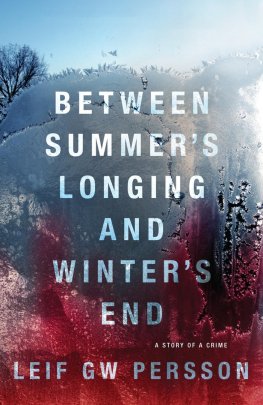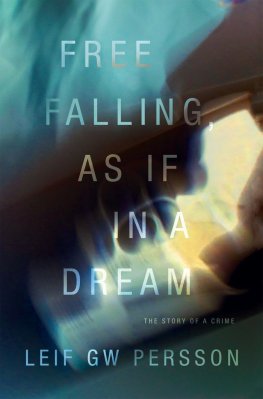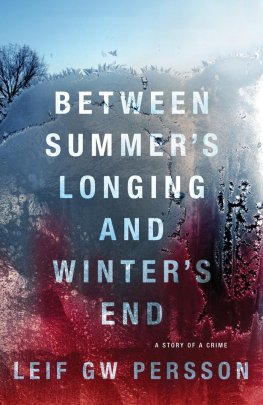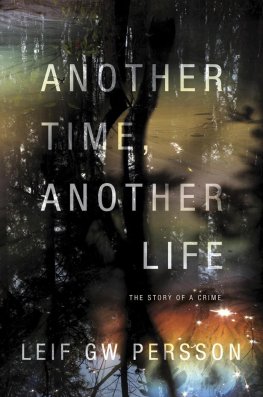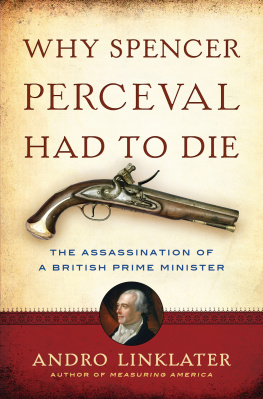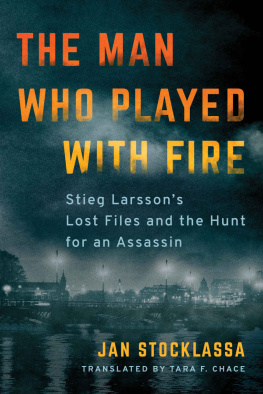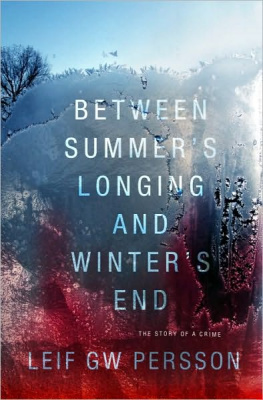Leif G. W. Persson
Between Summers Longing and Winters End
To the Bear and Mikael
The best informant is the one who hasnt understood
the significance of what he has told.
The Professor
Chapter I
Free falling, as in a dream
Stockholm in November
It was Charlie, age thirteen, who saved the life of Vindel, age fifty-five. At least thats how Vindel described it at the preliminary police hearing.
If Charlie hadnt looked up and pulled me to the side, that damn thing wouldve hit me right in the skull and I wouldnt be sitting here now.
It was a peculiar story right from the start, for three main reasons.
First, Charlie was thought to be deaf in both ears. Not least by Vindel himself, who was convinced that the only things Charlie understood nowadays were eye contact, sign language, and physical touch. Its true that Vindel talked with him more than ever, but thats only to be expected when someone you liked grew old and slowed down, and Vindel had always been kind to Charlie. Just what you would expect.
Second, it is a long-established axiom in Western physics that a free-falling body precedes the sound that said body produces by friction against the surrounding atmosphere. Thus, according to said physics, there would have been no noticeable sound whatsoever.
Third, and this was the most remarkable. If Charlie had heard something, noticed the danger, pulled Vindel aside, and thereby saved his life... why didnt he hear the sound of the victims left shoe, which, only a few seconds later, struck him right in the neck and killed him on the spot?
[FRIDAY, NOVEMBER 22]
Between 19:56 and 20:01 hours on Friday the twenty-second of November, three calls were routed via emergency number 90 000 to the command center of the Stockholm Police.
The first came from a retired lawyer who had seen the entire incident in detail from his balcony at Valhallavgen 38. The lawyer introduced himself by name and title and appeared not the least bit upset. His story was wordy and systematically outlined. Factually, it was completely off the wall.
In summary, the premise was that a lunatic dressed in a long black coat and a ski cap with earflaps had just shot down a poor dog owner and his dog. Now the lunatic was running around in circles, shouting incoherently; the reason that the lawyer found himself out on his balcony with the temperature below freezing was that his wife suffered from asthma and cigarette smoke had an unpleasant tendency to cling to the curtains: If you are wondering about that, sergeant?
The second call came from the taxi switchboard. One of their drivers had picked up an older woman at Valhallavgen 46, and as he held open the door to help his passenger into the backseat, he noticed from the corner of his eye a poor fellow who fell down from the roof of that tall building where all the students live. The driver was forty-five years old and had come to Sweden from Turkey twenty years earlier. He had seen worse things as a child and had learned early on that there is a time and a place for everything; that is why he called the switchboard on the radio, told what he had seen, and asked them to call the police, while he drove the old woman to her daughter, who lived on a farm outside of Mrsta. It was a good fare and life went on.
Phone call number three came from a man who, judging by his voice, seemed to be middle-aged. He refused to say what his name was and where he was calling from, but he sounded exhilarated in a way that indicated that he had ingested some stimulating substance. In addition he had some good advice. Now one of those crazy students has jumped off the roof again. Dont forget to bring a few buckets along when you come to pick him up.
At the command center everything was running along tracks laid down long ago. When the on-duty operator sent out an area alert on the radio, she had already lowered the priority of the verbose lawyer and raised that of the taxi driver and the exhilarated man with the good advice about buckets; she omitted the shooting, the dog, and the buckets.
Her message was that a person had fallen or jumped from the student dormitory called Rosehip on Krsbrsvgen and landed on the walkway above the parking lot across the street from the intersection of Valhallavgen and Frejgatan. A lifeless body would be found at the scene and a distraught male, dressed in a black coat and a peaked cap, wandering around in the vicinity. Was there a patrol car in the area that could take care of the whole thing?
There was one, only a hundred yards farther down Valhallavgen. It belonged to the stermalm precinct VD 2 and at the moment the alarm went out over the radio, the car was stopping in front of the hot-dog stand at the driveway to the Roslagstull hospital. In the car were two of the Stockholm Police Departments finest. In the drivers seat sat police officer in training Oredsson, age twenty-four. He was blond, blue-eyed, and broad-shouldered. He was doing his last round as a trainee and in a month he would become a police officer. A conviction also burned in Oredssons soul that, once he joined the police force, the struggle against the steadily increasing crime rate would enter a decisive phase in which good would come out the victor.
In the passenger seat beside him sat his immediate superior, police assistant Stridh, who was almost twice Oredssons age and went by the name Peace at Any Price among his older colleagues. Ever since they started their beat two hours ago his thoughts had focused exclusively on the plump sausage with mashed potatoes, cucumber-and-shrimp salad, mustard, and ketchup that would provide at least temporary relief from his miserable existence. Now he could smell it, but in the struggle over the microphone that was placed between him and Oredsson he had, of course, lost.
Two thirty-five here. Were listening, answered Oredsson. Energetic and alert as always.
Approximately at the same time as the retired lawyer contacted the female radio operator at the police departments command center, police superintendent Lars M. Johansson (M for Martin), head of the National Bureau of Criminal Investigation, stepped out through the entryway of his residence on Wollmar Yxkullsgatan in Sdermalm. Johansson disappeared down the street with brisk steps and in an excellent mood, en route to his first date with a woman who he knew was lovely to look at and in all likelihood nice to talk with as well. This would take place in a neighborhood restaurant nearby with food both excellent and reasonably priced. Outside it was a cold and starry evening without the least fleck of snow on the streets and sidewalks; all in all an almost ideal combination for a person who wanted to keep his head clear, his spirits high, and his feet dry.
Lars Martin Johansson was a solitary man. In the legal sense he had been so since the day almost ten years ago when his first, and so far only, wife left him, took their two children with her, and moved in with a new man, to a new life in a new house. In a spiritual sense he had been solitary his entire life, in spite of the fact that hed grown up with six siblings and two parents who had met more than fifty years ago, were still married to each other, and would remain so until death did them part. In Johanssons case, loneliness was not something inherited. It wasnt security, intimacy, and companionship that he lacked when he was growing up. Those had been there to excess and were still to be had, if that was what he wanted, but when as an adult he started to ransack his consciousness for happy memories from his childhood, the only ones he found were times when hed been left entirely in peace. When he stood alone on the stage, the only actor in the piece, by himself.
It would be quite an understatement to maintain that Johansson felt at home in his solitude. According to conventional models of human coexistence, it was considerably worse than that. Solitude was the necessary prerequisite for Johansson to function, in the ordinary human sense of shaping the days into a respectable life or in the purely professional sense of acquitting oneself well before other people without consideration for family and friends and feelings in the most general sense. In that respect, his wifes having left him and taken the children with her made existence almost ideal.

